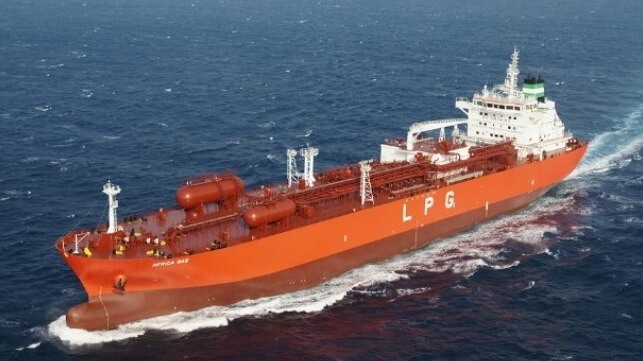Korean Researchers Cite Benefits for LPG as Alternative Maritime Fuel

A team of researchers from South Korea is promoting liquefied petroleum gas (LPG) as a potentially low-cost, eco-friendly alternative maritime fuel. Although a well-known fuel that the shipping and oil industries have developed a broad base of experience handling, the team said that the viability as a maritime fuel has not been assessed. Given its advantages and market competitiveness, the researchers however believe that LPG could open doors to zero carbon emission ships.
Despite the urgent efforts by regulatory agencies to find solutions to reduce harmful emissions, researchers from Korea Maritime and Ocean University highlighted that LPG has so far found little application in the shipping industry. Considering the current economic feasibility of the fuel as it relates to regulatory laws and the available technology, they set out to study LPG as a viable eco-friendly alternative fuel and provide the information that could support its certification.
“There is a lack of comprehensive assessment of the economic, environmental, and safety aspects of LPG-based fuel systems worldwide,” says Dr. Won-Ju Lee. “In our study, we identified ships with South Korean registrations that can be converted to LPG fuel use, and determined the reduction in fuel consumption, cost, and air pollutants from using LPG."
The study reviewed the current status of academic research, technological advancement in the area of LPG-fueled engines, development of market competitors, and the safety standards developed by the International Maritime Organization for LPG-fueled ships. The researchers investigated the feasibility of using LPG and conducted a statistical analysis of a database of 72,098 ships registered in South Korea.
The findings were encouraging the team reports in a new paper published in the Journal of Cleaner Production. "Unlike current shipping fuels such as heavy fuel oil, LPG does not generate marine pollutants during leaks and is applicable without restrictions on the ship size," says Dr. Lee.
The study highlights both the environmental benefits from using LPG as a marine fuel as well as the economic rewards for ship owners and operators. According to the study's theoretical estimates, switching to LPG reduces the annual fuel consumption by 7.5 to 10.4 percent resulting in a fuel cost reduction of between 8.8 and 25.9 percent.
Looking at the environmental benefits of using currently available technologies for gas-fueled engines, they report that LPG would reduce carbon dioxide emissions by 10 to 14 percent. The study projects that nitrogen oxide emissions would be lowered by 14 to 16 percent, while sulfur oxide/particulate matter emissions would be reduced by 98 to 99 percent.
"The results of this study could provide a reference for the national shipping industry to inform choices on using environment-friendly and low-cost fuel sources," says Dr. Lee. "Additionally, constructing LPG propulsion ships would help in making a more reliable estimate of the total cost of LPG retrofit, conversion, and operation."
The researchers concluded that LPG, as an alternative marine propulsion fuel, has advantageous characteristics and market competitiveness, particularly for fishing vessels as well as small and medium-sized vessels. They recommended promoting LPG as an attractive eco-friendly marine fuel by subsidizing its prices and formulating government policies favoring its usage.
